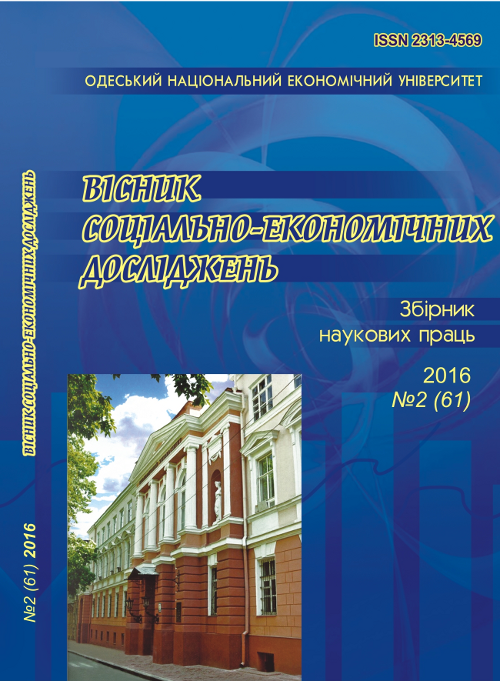The role of knowledge in the modern economy
DOI:
https://doi.org/10.33987/vsed.2(61).2016.127-135Keywords:
knowledge, knowledge function, economy of knowledge, knowledge economy, new economyAbstract
The use of individual and collective knowledge in the modern world is becoming the main condition for the formation of the modern economy. The main goal of the article is to summarize the approach to the definition of «economy, based on knowledge» and its specific characteristics. The approaches of different scientists to the categories of «economy of knowledge» and «knowledge economy» are investigated. The specific features of «economy of knowledge» are summarized. The functions of knowledge in the new format economy are considered. Recommendations for further developments in the study of essence and characteristics of «knowledge economy» are formulated.
References
Machlup, F. (1966), Production and dissemination of knowledge in the USA. Trans. from Eng. [Proizvodstvo i rasprostranenie znaniy v SSHA; per. s аngl.], Progress, Мoscow, 462 p. (rus)
Crawford, R. (1991), In the Era of Human Capital: The Emergence of Talent, Intelligence and Knowledge as the Worldwide Economic Force and Means to Managers and Investors, Harper Business, New York, p. 4.
Geyets, V. (2004), «Character of transition process to the knowledge economy» [Kharakter perekhidnykh protsesiv do ekonomiky znan], Economy of Ukraine, No. 4, pp. 4–14 (ukr)
Makarov, V. L. (2003), Knowledge Economy: Lessons for Russia [Ekonomika znaniy: uroki dlya Rossii], Bulletin of the Russian Academy of Sciences, vol. 73, No. 5, pp. 450–462, available at: http://www.nkj.ru/archive/articles/2874 (rus)
Kleiner, G. B. (2006), Microeconomics of knowledge and myths of the modern theory [Mikroekonomika znaniy i mify sovremennoy teorii], Higher education of Russia, No. 9, pp. 32–37, available at: http://vovr.ru/upload/9-06.pdf (rus)
Gokhberg, L. M. (2003), National innovation system of Russia in the conditions of «new economy», [Natsionalnaya innovatsionnaya sistema Rossii v usloviyakh «novoy ekonomiki»], Voprosy ekonomiki, No. 3, pp. 26–45 (rus)
Zharinova, A. H. (2010), Knowledge Economy: the content and role of human intelligence in its formation [Ekonomika znan: zmist ta rol intelektu liudyny v yii formuvanni], Problems of infrastructure efficiency improving, NAU, Kyiv, issue 28, 247 p. (ukr)
Vizirenko, S. V. (2012), The genesis of «knowledge economy» term [Genezys poniattia «ekonomika znan»], Sustainable economic development, No. 2 (12), pp. 44–49 (ukr)
Chukhno, A. (2005), A New Economic Policy (theoretical and methodological principles) [Nova ekonomichna polityka (teoretyko-metodolohichni zasady)], Economy of Ukraine, No. 6, pp. 4–10 (ukr)
Nosan, N. S. (2011), Knowledge Economy: essence, prospects and development in Ukraine [Ekonomika znan: sutnist, perspektyvy i rozvytok v Ukraini], Actual problems of economics, No. 5 (119), pp. 12–19, available at: http://www.nbuv.gov.ua/old_jrn/soc_gum/APE/2011_5/APE-2011-05/12-19.pdf (ukr)
Avdokushin, E. F. (2009), About the prerequisites and the essence of «new economy» [O predposylkakh i sushchnosti «novoy ekonomiki»], Questions of new economy, Vyatskiy Social and Economic Institute, No. 3 (11), pp. 4–26 (rus)
Zhuravleva, G. P. (2009), New course of economic theory: Fundamentals of economic systems transformation theory and «economy of the future» formation [Novyy kurs ekonomicheskoy teorii: Osnovy teorii transformatsii ekonomicheskikh sistem i formirovaniya «ekonomiki budushchego»], Tambov, Моscow, 497 p. (rus)
Castells, M. (2000), The information age: economy, society and culture. Trans. from Eng. О. I. Shkaratan [Informatsionnaya epokha: ekonomika, obshchestvo i kultura; per. s angl. О. I. Shkaratana], GU VSHE, Мoskva, 608 p. (rus)
Kelly, K. (1998), New Rules for the New Economy: 10 Radical Strategies for a Connected World, Viking Penguin, New York, 180 р.
Mindeli, L. E., Pipia, L. K. (2007), Conceptual aspects of knowledge economy formation [Kontseptualnye aspekty formirovaniya ekonomiki znaniy], Problems of Forecasting, No. 3, pp. 115–138, available at: http://issras.ru/publication/docs/pipiya/P&M-PP-03-2007-10.pdf (rus)
Chentsova, M. V. (2007), The main features of knowledge economy: theoretical aspect [Osnovnye cherty ekonomiki znaniy: teoreticheskiy aspekt], Bulletin of Finance Academy, No. 3 (43), pp. 105–130 (rus)
Moiseev, N. N. (1996), The Information Society as a stage in the modern history [Informatsionnoe obshhestvo kak etap noveyshey istorii], Free Thought, No. 1, p. 82 (rus)
Tishchenko, V. F. (2013), A retrospective analysis of dissertation research on the development problem of knowledge economy in Ukraine [Retrospektyvnyi analiz dysertatsiinykh doslidzhen z problem rozbudovy ekonomiky znan v Ukraini], Bulletin of ZSTU, No. 2 (64), pp. 169–176 (ukr)
Butnik-Siverskyi, O. B. (2008), Innovation and intellectual economics (theoretical and methodological aspects) [Innovatyka ta intelektualna ekonomika (teoretyko-metodolohichnyi aspekt)], Theory and Practice of Intellectual Property, No. 1, pp. 63–77 (ukr)
Downloads
Published
Issue
Section
License
Copyright (c) 2016 Socio-Economic Research Bulletin

This work is licensed under a Creative Commons Attribution 4.0 International License.






